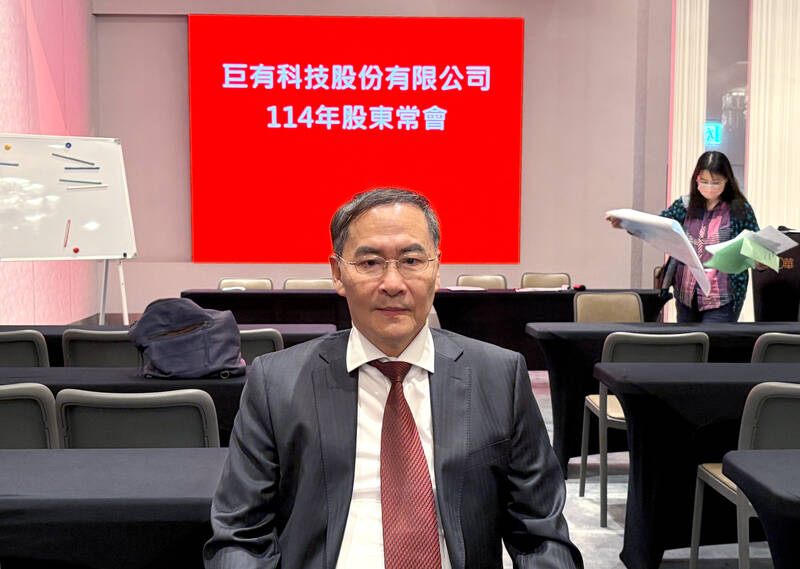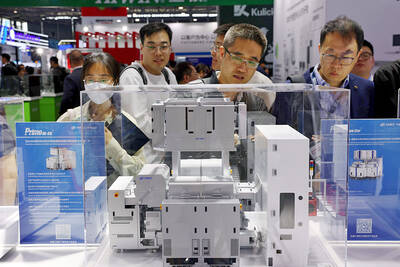Progate Group Corp (巨有科技), an application-specific integrated circuit (ASIC) developer, said it expects revenue to grow this year, backed by rapidly growing demand for artificial intelligence (AI) chips, given the rise in AI applications, from cloud to edge devices.
“We are expecting growth momentum to pick up this year following the end of inventory correction,” Progate CEO Fred Lai (賴志賢) said on Thursday.
The company has received more than 80 chip designing projects, which would generate non-recurring engineering (NRE) revenue for Progate, like most ASIC companies, he said.

Photo: Lisa Wang, Taipei Times
About 20 percent of those projects are based on 28-nanometer or advanced technologies, Lai said.
As AI applications are proliferating to edge devices, Progate is seeing a spike in demand for high-performance and energy efficient ASICs, he said.
“With more design projects coming in, we are holding an optimistic view about this year. Not a cloud in the sky,” Lai said.
Progate is also upgrading its technology capabilities to help design 6-nanometer chips, he said, adding that the company had taped-out its first 6-nanometer chip in February.
A major portion of the NRE projects last year were designed on less-advanced technologies, such as 65-nanometer, 90-nanometer and 0.11-micron technologies, Lai said.
The company plans to hire an additional 10 to 20 research-and-development engineers to cope with growing customer demand, he added.
The company has seen a 25 percent revenue pick up to NT$285 million (US$9.49 million) over the past four months. Last year, Progate posted an annual decline of 38 percent in revenue to NT$682 million.
About 35 percent of last year’s revenue came from NRE income and 65 percent from payments after customers’ chips entered mass production.
The company’s shareholders on Thursday approved a cash dividend of NT$1.6 per common share.
The company saw net profit plummet about 61 percent to NT$63 million last year. That translated into earnings per share of NT$1.65.

With this year’s Semicon Taiwan trade show set to kick off on Wednesday, market attention has turned to the mass production of advanced packaging technologies and capacity expansion in Taiwan and the US. With traditional scaling reaching physical limits, heterogeneous integration and packaging technologies have emerged as key solutions. Surging demand for artificial intelligence (AI), high-performance computing (HPC) and high-bandwidth memory (HBM) chips has put technologies such as chip-on-wafer-on-substrate (CoWoS), integrated fan-out (InFO), system on integrated chips (SoIC), 3D IC and fan-out panel-level packaging (FOPLP) at the center of semiconductor innovation, making them a major focus at this year’s trade show, according

DEBUT: The trade show is to feature 17 national pavilions, a new high for the event, including from Canada, Costa Rica, Lithuania, Sweden and Vietnam for the first time The Semicon Taiwan trade show, which opens on Wednesday, is expected to see a new high in the number of exhibitors and visitors from around the world, said its organizer, SEMI, which has described the annual event as the “Olympics of the semiconductor industry.” SEMI, which represents companies in the electronics manufacturing and design supply chain, and touts the annual exhibition as the most influential semiconductor trade show in the world, said more than 1,200 enterprises from 56 countries are to showcase their innovations across more than 4,100 booths, and that the event could attract 100,000 visitors. This year’s event features 17

Germany is to establish its first-ever national pavilion at Semicon Taiwan, which starts tomorrow in Taipei, as the country looks to raise its profile and deepen semiconductor ties with Taiwan as global chip demand accelerates. Martin Mayer, a semiconductor investment expert at Germany Trade & Invest (GTAI), Germany’s international economic promotion agency, said before leaving for Taiwan that the nation is a crucial partner in developing Germany’s semiconductor ecosystem. Germany’s debut at the international semiconductor exhibition in Taipei aims to “show presence” and signal its commitment to semiconductors, while building trust with Taiwanese companies, government and industry associations, he said. “The best outcome

Semiconductor equipment billings in Taiwan are expected to double this year, as manufacturers in the industry are keen to expand production to meet strong global demand for artificial intelligence applications, according to SEMI, which represents companies in the electronics manufacturing and design supply chain. Speaking at a news conference before the opening of Semicon Taiwan trade show tomorrow, SEMI director of industry research and statistics Clark Tseng (曾瑞榆) said semiconductor equipment billings in Taiwan are expected to grow by an annual 100 percent this year, beating an earlier estimate of 70 percent growth. He said that Taiwan received a boost from a